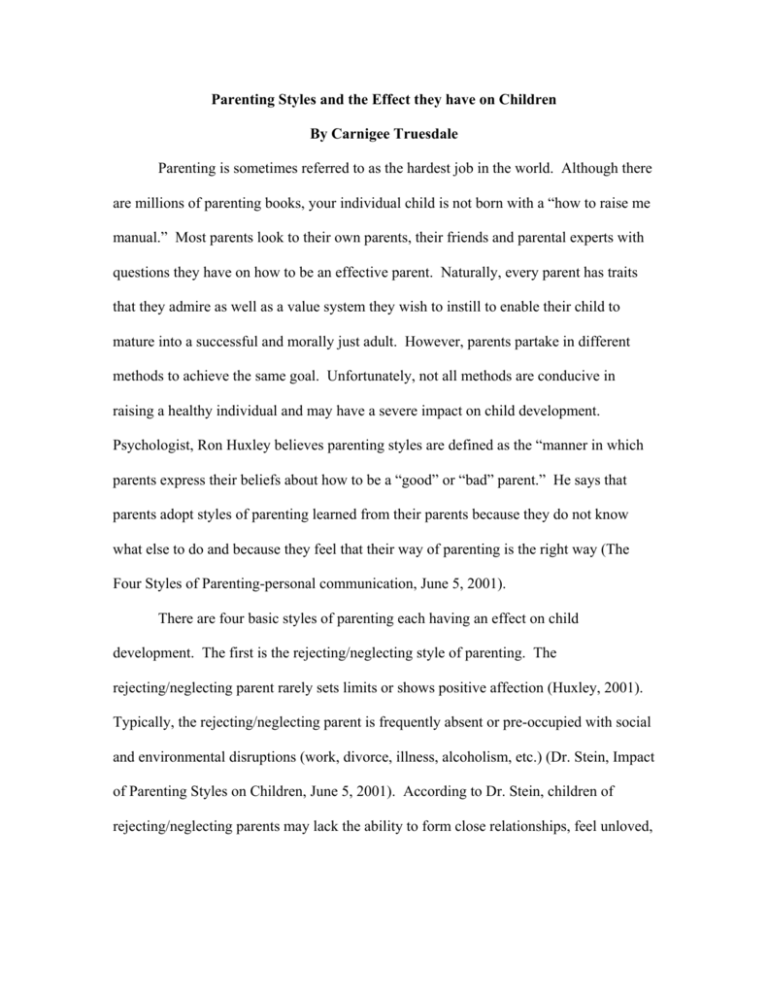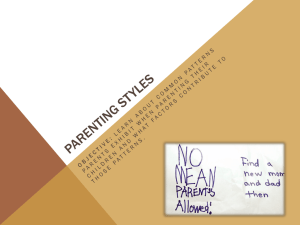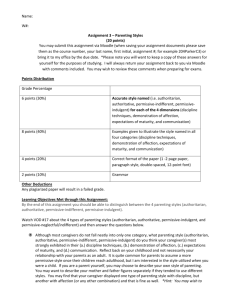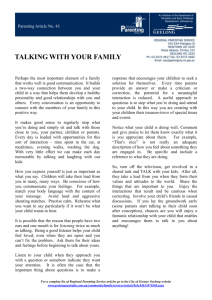Parenting Styles and the Effect they have on
advertisement

Parenting Styles and the Effect they have on Children By Carnigee Truesdale Parenting is sometimes referred to as the hardest job in the world. Although there are millions of parenting books, your individual child is not born with a “how to raise me manual.” Most parents look to their own parents, their friends and parental experts with questions they have on how to be an effective parent. Naturally, every parent has traits that they admire as well as a value system they wish to instill to enable their child to mature into a successful and morally just adult. However, parents partake in different methods to achieve the same goal. Unfortunately, not all methods are conducive in raising a healthy individual and may have a severe impact on child development. Psychologist, Ron Huxley believes parenting styles are defined as the “manner in which parents express their beliefs about how to be a “good” or “bad” parent.” He says that parents adopt styles of parenting learned from their parents because they do not know what else to do and because they feel that their way of parenting is the right way (The Four Styles of Parenting-personal communication, June 5, 2001). There are four basic styles of parenting each having an effect on child development. The first is the rejecting/neglecting style of parenting. The rejecting/neglecting parent rarely sets limits or shows positive affection (Huxley, 2001). Typically, the rejecting/neglecting parent is frequently absent or pre-occupied with social and environmental disruptions (work, divorce, illness, alcoholism, etc.) (Dr. Stein, Impact of Parenting Styles on Children, June 5, 2001). According to Dr. Stein, children of rejecting/neglecting parents may lack the ability to form close relationships, feel unloved, helpless and isolated. Children may even develop bitter, hostile and anxious feelings (Stein, 2001). The second parenting style is the authoritarian parent who is very restrictive, punitive and shows little positive affection. Authoritarian parents are very strict and encourage perfectionism. Physical punishment is sometimes used for discipline or training. Dr. Stein believes children of authoritarian parents develop self-guilt and selfhatred that could lead to low self-esteem (2001). The third parenting style is the permissive parent who shows a lot of positive affection but rarely disciplines or sets limits. Within this parental dimension the roles are often switched. The child has control and manipulates the parents, and the parents become the children. Sometimes a permissive parent may shower the child with gifts and certain privileges without regard to the child’s specific needs. Permissive parents may also submit to the child’s demands, temper tantrums or impulsivity to calm the child. Children of permissive parents fail to take initiative, ignore the rights and respect for others and lose responsibility (Stein, 2001). The last parenting style is authoritative or democratic/balanced. The authoritative parent exhibits high amounts of positive affection and disciplinarian techniques. The authoritative parental style is based on democratic concepts such as equality and trust. Parents and children are equal in terms of their needs for respect and self-worth but not in terms of responsibility and making decisions (Huxley, 2001). Children of authoritative parents feel secure, accepted, have autonomy and find satisfaction in achievement and contribution (Stein, 2001). It appears that modeling and imitation may have the most beneficial effect on childhood development. Dr. Firestone believes that the modeling effect derived from the child’s daily living with their parental figures who themselves should consistently behave in a responsible manner, is more important than specific training or disciplinary measures (1990). Toxic personality traits in parents not only have a profoundly destructive effect on children directly, but the negative qualities are passed on to succeeding generations through the process of identification and imitation (Firestone, 1990). Instead of turning to everyone else for answers on how to be an effective parent, parents should look within themselves first and become the person they want their children to emulate. For further information regarding this article please contact the Maternal Substance Abuse and Child Development Project, Emory University School of Medicine, Department of Psychiatry and Behavioral Sciences, Emory West Campus, 1256 Briarcliff Road N.E., Suite 323-West, Atlanta GA, 30306. You can email us at msacd@listserv.cc.emory.edu, visit our website at http://www.emory.edu/MSACD, or phone us at 404-712-9800. 7KH0DWHUQDO6XEVWDQFH$EXVHDQG&KLOG'HYHORSPHQW3URMHFWLVIXQGHGLQSDUWE\WKH *HRUJLD'HSDUWPHQWRI%HKDYLRUDO+HDOWK'HYHORSPHQWDO'LVDELOLWLHV'%+''










